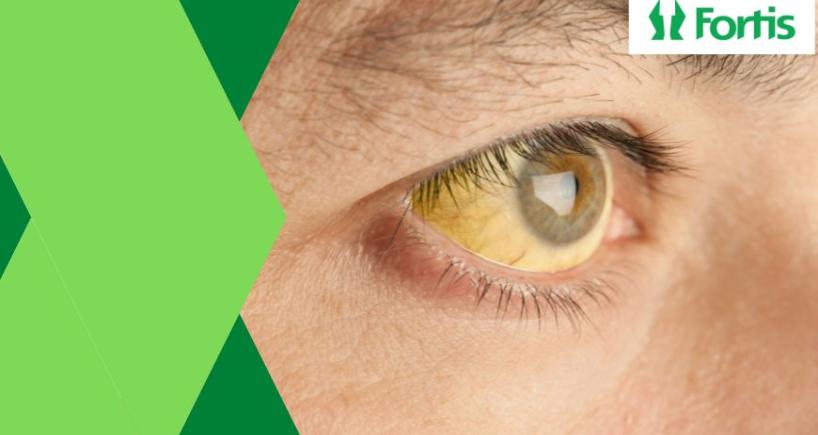
Is Jaundice contagious?
Is Jaundice Contagious?
No, Jaundice is not contagious, but the underlying conditions that cause it can be. Jaundice is common in newborn babies and older adults, however, it can develop in people of all ages. Doctors at Fortis Hospital, Mulund, explain what exactly jaundice is, its causes and symptoms, how healthcare professionals diagnose and treat the disease when to seek medical help, and how a person can take steps to help control it or prevent it from occurring.
What is Jaundice?
Jaundice is a condition where the skin, mucous membranes, and whites of the eyes turn yellow due to the accumulation of an excess of bilirubin, a yellowish substance formed when part of red blood cells breaks down. Jaundice happens when the body does not process bilirubin as it should be.
What causes Jaundice?
Jaundice has many different causes - some of which can be contagious.
Causes of jaundice that can be contagious:
Some of these conditions (such as viral hepatitis) can cause jaundice as a symptom and include:
1. Hepatitis A
This disease spreads through contact with an infected person’s faeces or urine. Getting the hepatitis A vaccine can help you stay protected against hepatitis A virus infection.
2. Hepatitis B
This virus spreads through contact with an infected person’s blood, semen, or other body fluids. You can reduce your risk by getting the hepatitis B vaccine.
3. Hepatitis C
Like hepatitis B, this virus can be spread by sharing needles or items, and having sexual contact without barrier protection. Early diagnosis and treatment is crucial as medicines can help cure most cases of hepatitis C.
4. Hepatitis D
This condition is unusual as it can only infect you when you also have hepatitis B virus infection. It can be spread through contact with blood or other bodily fluids of an infected person. Taking steps against hepatitis B, including getting the hepatitis B vaccine, can help you protect yourself from getting infected.
5. Hepatitis E
This virus mainly spreads by drinking water or eating food contaminated by an infected person’s stool. It is usually an acute infection that resolves on its own after a few weeks.
6. Yellow fever
It is an infectious disease spread by Aedes aegypti mosquitoes, causing bleeding, jaundice, kidney and liver failure. You can reduce your risk or prevent it by getting the yellow fever vaccine.
7. Weil’s disease
A bacterial disease that can be contracted through contact with an infected animal’s urine, blood or tissue, mostly occurring through contaminated soil or water.
Potential causes of jaundice that aren’t contagious may include:
1. Gilbert’s syndrome
An inherited liver condition in which the liver cannot properly process bilirubin
2. Autoimmune haemolytic anemia
A rare immune disorder in which the immune system mistakenly destroys a person’s own red blood cells.
3. Sickle cell anaemia
A genetic disease of the red blood cells in which the RBCs have an abnormal C-shape, resembling a sickle, instead of round flexible discs.
4. Polycythemia vera
A rare type of blood cancer that causes your bone marrow to produce too many red blood cells.
5. Nonalcoholic fatty liver disease
An umbrella term for a range of conditions in which fat builds up in the liver, which may lead to liver damage.
6. Cholestasis
A condition where the flow of bile from the liver is reduced or stopped.
7. Sepsis
A medical emergency caused by the body’s response to an infection.
8. Wilson’s disease
An inherited disorder that causes excessive amounts of copper to accumulate in the liver, brain, and other vital organs.
9. Cancers
Certain types of cancer such as cancer of the liver, pancreas, or gallbladder can cause jaundice (as a symptom) that aren’t contagious.
What are the signs and symptoms of Jaundice?
Common signs and symptoms of jaundice include:
- Yellowing of the skin (in infants, the yellowish tint
- A yellow tinge to the whites of the eyes and mucous membranes
- Itchy skin
- Dark or brown-coloured urine
- Clay-coloured stool
Other symptoms (depending on the underlying causes) of jaundice may include weight loss, fever, chills, abdominal pain, fatigue, nausea, and vomiting, etc. Some people may not have symptoms of jaundice, and the condition may be diagnosed accidentally.
How is Jaundice diagnosed?
To diagnose jaundice, doctors will start by performing a physical examination to check for signs of jaundice - paying close attention to the abdomen and skin. They may also ask about your medical history and lifestyle.
Other tests may include:
- Bilirubin tests
- Complete blood count
- Liver function tests
- Hepatitis A, B and C tests
- Liver biopsy
- Cholesterol level
- Abdominal ultrasound
- Abdominal CT scan
- Endoscopic retrograde cholangiopancreatography (ERCP)
- Magnetic resonance cholangiopancreatography (MRCP)
How is Jaundice treated?
Jaundice is a sign of a more serious health problem. Therefore, treatment will depend on the condition that’s causing jaundice. In adults, jaundice itself usually doesn’t require treatment. Treatment options in infants differ, ranging from changes in feeding to blood transfusion in more serious cases. If you have been diagnosed with jaundice, your healthcare provider will recommend the best option to treat the condition that’s causing it.
For instance, jaundice caused by hepatitis can be often managed with diet and lifestyle modifications - like drinking lots of water, getting plenty of rest, and avoiding alcohol and medicines that affect the liver. If your jaundice is caused by gallstones, you might need treatment, which typically involves removing the gallbladder. For other causes of jaundice such as a blocked bile duct, your doctor may suggest surgery to open it.
At Fortis Hospital, Mulund, we have the most experienced team of physicians, gastroenterologists, and hepatologists who work together to properly diagnose and treat jaundice at any stage. Our multi-disciplinary team of experts adopts a more personalized treatment plan based on every individual patient’s condition, which might vary in duration, too.
Can Jaundice be prevented?
There’s no definite way to prevent jaundice, as the condition has different causes, which need to be investigated by a doctor. However, there are steps you can take to prevent underlying diseases and reduce your risk. These include:
- Eating a balanced diet
- Exercising regularly
- Maintaining a healthy weight
- Limiting alcohol consumption
- Taking precautions to avoid hepatitis infection
- Getting vaccinated against hepatitis B
- Keeping cholesterol levels in check
- Taking medicines as prescribed
- Practicing good hygiene and safer sex
When should you see a doctor for Jaundice?
You should see a doctor as soon as possible if you notice yellowing of your skin, the whites of your eyes, or any other symptoms of jaundice. Treating the underlying cause can help resolve your jaundice as well as prevent complications.
Key Takeaway
Jaundice is typically a sign of another health problem that involves the liver. It occurs due to excess bilirubin in your blood, causing your skin and the whites of your eyes to become yellow, besides other symptoms. While jaundice itself isn’t a dangerous condition, some of its causes can be life-threatening. Hence, jaundice should be promptly treated for its underlying cause.
Medically Reviewed by,
Dr. Sagar Punjabi
Consultant Internal Medicine
Fortis Hospital Mulund
Categories
Clear allMeet the doctor

- Internal Medicine | General Physician | Internal Medicine
-
3 Years
-
1050









